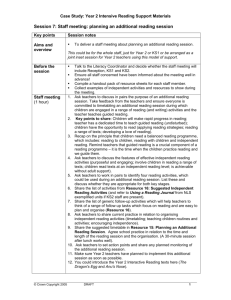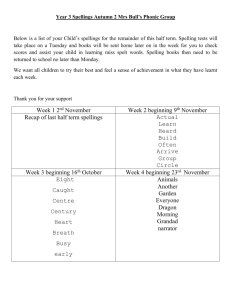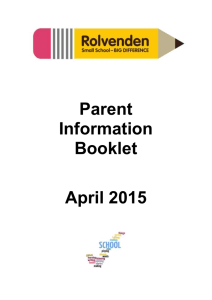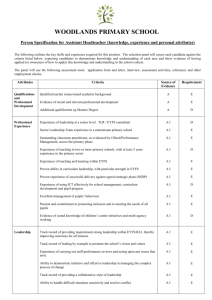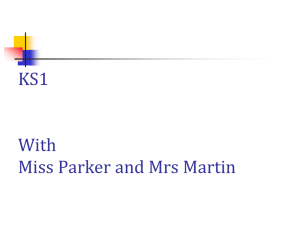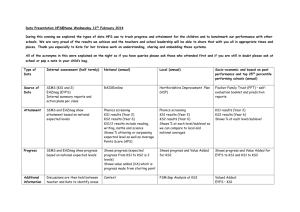English Policy Jan 2015
advertisement
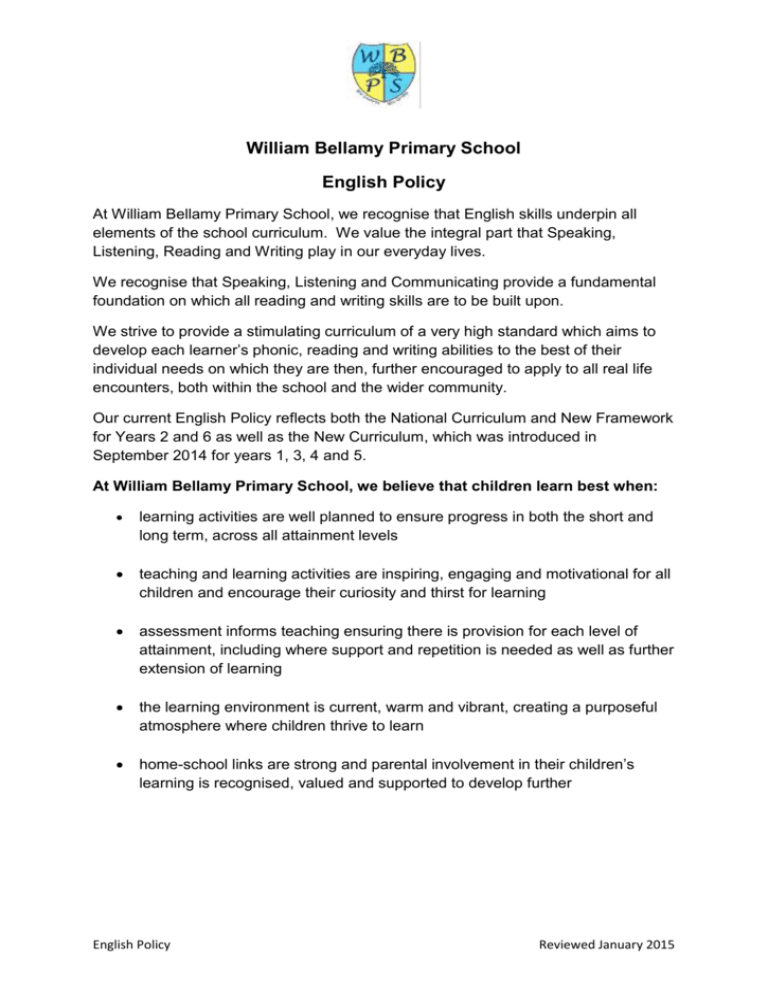
William Bellamy Primary School English Policy At William Bellamy Primary School, we recognise that English skills underpin all elements of the school curriculum. We value the integral part that Speaking, Listening, Reading and Writing play in our everyday lives. We recognise that Speaking, Listening and Communicating provide a fundamental foundation on which all reading and writing skills are to be built upon. We strive to provide a stimulating curriculum of a very high standard which aims to develop each learner’s phonic, reading and writing abilities to the best of their individual needs on which they are then, further encouraged to apply to all real life encounters, both within the school and the wider community. Our current English Policy reflects both the National Curriculum and New Framework for Years 2 and 6 as well as the New Curriculum, which was introduced in September 2014 for years 1, 3, 4 and 5. At William Bellamy Primary School, we believe that children learn best when: learning activities are well planned to ensure progress in both the short and long term, across all attainment levels teaching and learning activities are inspiring, engaging and motivational for all children and encourage their curiosity and thirst for learning assessment informs teaching ensuring there is provision for each level of attainment, including where support and repetition is needed as well as further extension of learning the learning environment is current, warm and vibrant, creating a purposeful atmosphere where children thrive to learn home-school links are strong and parental involvement in their children’s learning is recognised, valued and supported to develop further English Policy Reviewed January 2015 Reading At William Bellamy Primary School we aim for all children to read with confidence, fluency and understanding. We strive for all children to be motivated, independent readers, who truly enjoy reading for a range of purposes. Shared Reading Shared Reading is for those children who are not yet reading pink band books. Sessions are also beneficial for children reading pink and red band books who need support to understand and sequence a story. Shared Reading is an interactive reading experience that occurs when students join in or share the reading of a book or other text while guided and supported by a teacher or teaching assistant. The adult explicitly models the skills of proficient readers, including reading with fluency and expression. The shared reading model often uses oversized books (“big books”) with enlarged print and illustrations. After reading and joining in with a text, the children partake in activities based on simple word reading or re-telling and discussing the story at a basic level. Guided Reading Guided Reading is for those children who are reading from pink band books up to gold band books. At this stage children still need some support with word reading. Children are streamed into groups of a maximum of 6, based on the colour they are reading at. The teacher chooses a book that is suitable for each group. In guided reading sessions, the lead adult begins with a book introduction. This is where the adult introduces any challenging words or some reoccurring high frequency words which may appear in the text. Learning Goals are shared with each group before reading. Each group is given 2-3 learning goals (selected from the New Curriculum) which should include both word reading strategies and a comprehension based goal. After the book introduction, the children read their book independently, at their own pace. The role of the lead adult is to listen to the children individually, support where necessary and encourage children to meet their learning goals. The lead teacher then facilitates a discussion, in order to ensure that the children have understood their text. The lead teacher also plans 2-3 questions encouraging the children to think more deeply about what they have read. I.e. simple inference, prediction, making text-self connections etc. Reciprocal Reading Reciprocal Reading is for those children who are reading from white band books onwards. English Policy Reviewed January 2015 At this stage, children are able to self-monitor and clarify meanings of new vocabulary independently. Children are streamed into groups of a maximum of 6, based on their ability. The teacher chooses a book that is suitable for each group. During Reciprocal Reading Session children: -improve comprehension skills -develop higher order thinking skills i.e. analyse, speculate, evaluate -increase their enjoyment of reading -develop their opinions -gain the ability to argue/debate, discuss and justify their opinions -develop the ability to discuss and hold dialogue about the text with minimal teacher input and teacher talk Read Aloud Sessions We recognise the importance of our teaching staff reading aloud to the children. At the end of each school day, teachers read to their classes. In EYFS and KS1, teachers share high quality picture books with the children. In KS2, teachers read a novel to the children. They are also to incorporate opportunities to read high quality picture books to the children. EYFS (Nursery and Reception) Children should become immersed in an environment rich in print and possibilities for communication. From the beginning of the academic year, children participate in daily Shared Reading sessions and are read to on a daily basis. From Autumn 2, children take part in daily Guided Reading sessions and read with an adult twice a week. Key Stage One (Year 1 and 2) Children should begin to read fiction and non-fiction independently and with enthusiasm. From the beginning of the academic year, children take part in daily Guided Reading sessions and read with an adult twice a week. Children also participate in a range of word reading and comprehension activities to follow-up after Guided/Reciprocal Reading session. Children are encouraged to explain and discuss their understanding of books, poems and other material, both those they have listened to and read for themselves. Key Stage Two (Years 3-6) Children should read a range of texts and respond to them showing a deeper level of comprehension. From the beginning of the academic year, children take part in daily Reciprocal Reading sessions and read with an adult at least twice per week. Children also participate in a range of comprehension activities to follow-up after Reciprocal Reading session. English Policy Reviewed January 2015 It is expected that all children have one piece of comprehension based recorded learning in their blue books weekly. Assessment In EYFS children are assessed according to Early Concepts in Print and benchmarking is done once they are able to read. Across KS1 and 2, children are benchmarked up to an early Stage 2, as well as using the Personalised Coaching document. Book Nooks Each class teacher has the responsibility to decide on an exciting theme for their book nooks. Teachers are expected to create innovative and inviting books nooks with the aim to grasp children’s attention and build on their enjoyment of reading. It is also important that there are a range of fiction and non-fiction books available to the children, as well as posters and vocabulary on display. Task cards are also to be made available to make book browsing sessions purposeful. Home Reading In KS1 children choose and swap their books twice a week. In KS2 children choose and swap their books when needed. In KS1 it is expected that parents/carers read with their children for 10 minutes a day and sign the log book daily. In KS2 it is expected that children read daily and comment on what they have read in their reading log and parents to sign. Reading logs and the changing of books is monitored by members of staff. Competition/Special Events After every April holiday, we hold the Catch Me Reading competition. Children bring in pictures of themselves reading over the holiday in very interesting and innovative places. The most obscure and interesting pictures from each key stage win fun and exciting prizes. Children are expected to read every day, including weekends and holidays. After each half term, our Holiday Readers competition takes place. The class with the most readers in each key stage wins. Children’s names are also displayed on reading displays and the school website. World book Day takes place annually. Children are given the opportunity to dress up according to book themes and they enjoy a day of book related activities. English Policy Reviewed January 2015 Parent links Bedtime Stories Workshops Home Reading EYFS library Writing At William Bellamy Primary School we aim for all children to write with confidence, creativity and pride. We strive for all children to be motivated, independent writers, who truly enjoy writing for a range of purposes. We have a ‘talk for writing’ approach where all EYFS and KS1 staff are trained as Every Child a Talker (ECAT) to further develop children’s receptive and expressive language. Across KS1 and 2 we have a ‘no pens day’ at the start of each genre, in order to give children opportunities to creatively immerse themselves in a genre through Speaking and Listening activities. Shared Writing Shared writing takes place in whole class teaching, where ideas are shared and discussed. These ideas are then recorded by teacher modelling the skills needed to write successfully. Children are then given opportunities to practise and extend their own writing in differentiated groups. Guided Writing Each day the class teacher and teaching assistant each have a focussed group of children to work with. In this session, ideas are shared and discussed and then recorded by teacher, modelling the skills needed to write successfully. Children then record a neat copy of the model provided in order to motivate and inspire their own creativity. This process can be repeated again depending on the ability of the learners. Children are also given the opportunity to guided writing in partners and are thereafter given an opportunity to write independently. Assessment In EYFS children’s mark making is assessed daily according to the Development Matters. Across KS1 and 2, children write end of genre pieces, as well as an assessment piece each half term. These are assessed using the Personalised Coaching document and a child is given a cumulative attainment point each half term. For assessment pieces, children are guided through the writing process by producing a first draft, editing and improving and then producing a final draft in their best handwriting. English Policy Reviewed January 2015 Competition/Special Events More Able writing workshops are scheduled throughout the year and, at least one is hosted by our school. Our children are given the opportunity to express their creativity by partaking in the borough-wide Poetry Competition on an annual basis. This year, we will be hosting the borough-wide Drama Festival. Parent links Workshops Basic Skills Spellings Spellings are given once children are able to spell most of the common exception words. Spellings are the same as the common exception words and follow the same progression. Children are taught to follow the LSCWC (Look, Say, Cover, Write and Check) procedure when learning new spellings. Spellings are sent home for children to practise over the weekend. Spellings are assessed once a week. Spellings are assessed by the writing of individual words and by dictated sentences depending on the ability of individual children. Phonics Staff use Letters and Sounds to teach letter sounds. Phonics is taught daily in EYFS/KS1 for 20-25 minutes and 3 x a week in KS2, for 30 minutes, where required. Phonic friezes are visible in all classrooms in EYFS/KS1 and in corridors in KS2. Each phonic phase is supported by suggested lesson plans and a fully resourced box of activities. Each year group has access to boxes of resources from all phases depending on the levels of the children. EYFS send home phonics sheets for writing and phonic practice. Phonic assessments are carried out every 10-12 weeks. Children are banded and streamed according to the next challenging Phase. Some phases are split into 2 or 3 sub-phases to allow greater concentration on specific sounds as well as more progress. English Policy Reviewed January 2015 Parents are invited to Phonic workshops where they practise the correct pronunciation for different sounds, blending and segmenting them and how to support their children when applying this to their reading and writing development. Handwriting The Nelson Handwriting scheme has been implemented throughout the school from Nursery to Year 6. Starting in Reception, handwriting lessons are timetabled at least twice a week for 30 minutes. We have high expectations for teacher modelled as well as children’s handwriting during all lessons. Grammar The Rising Stars scheme has been implemented throughout the school from Year 1 to Year 6. Starting in Year 1, grammar lessons are timetabled at least twice a week for 30 minutes. We have high expectations for teacher modelled language as well as children’s grammar during all lessons and throughout the school day. Starting in Year 1, all classes have Spelling, Punctuation and Grammar (SPAG) learning walls to support children’s development. English Policy Reviewed January 2015
